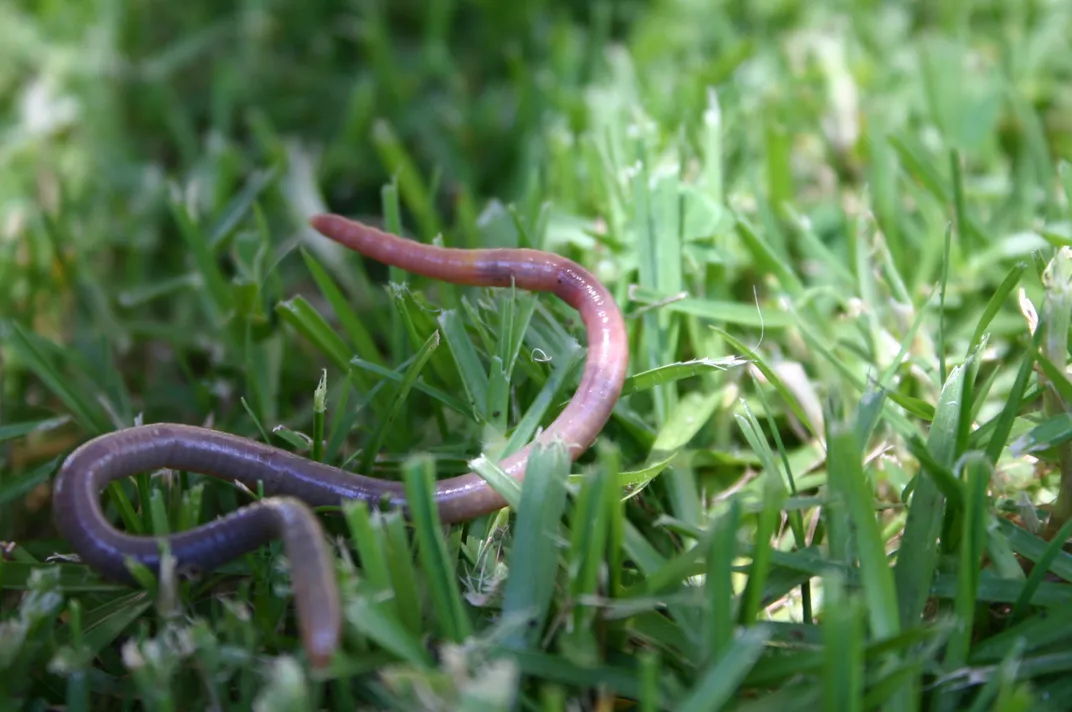Earthworms Reproduce in Faux Mars Soil For the First Time
A vital component of healthy Earth gardens, scientists are testing their resilience in the harsh Red Planet environment
/https://tf-cmsv2-smithsonianmag-media.s3.amazonaws.com/filer/59/fd/59fd293d-de36-4578-836f-0717606fcd66/istock-490343848.jpg)
A research lab in the Netherlands just brought us one step further on our path to living—and farming—on Mars. And they got some help from an unlikely creature: earthworms.
Worms are vital for any healthy garden, aiding in the process of breaking down dead plant material and recycling nutrients like nitrogen and potassium, which are necessary for plant survival. But Mars soil is a far cry from the nutrient-rich environment familiar to the wriggly creatures on Earth, Sarah Gibbens reports for National Geographic. So researchers at Wageningen University were surprised to find that a colony of earthworms were thriving in the faux dirt, and were actually able to reproduce.
Wieger Wamelink, a biologist at Wageningen University, has been investigating farming methods so future Martian colonists could grow their own food. In their latest test, the researchers placed adult earthworms and a slurry of pig fertilizer in the faux Mars soil in an attempt to grow rucola, also known as rocket greens, according to the university release.
Wamelink was using the faux Martian soil known as Mars-1A, which is created from the volcanic rocks of the Pu’u Nene volcano in Hawaii that mimics the sterilized dust that blankets Mars. He expected that adding the pig manure into this nutrient-lacking soil would help grow the greens, he explains in the press release. “However, the best surprise came at the end of the experiment when we found two young worms in the Mars soil simulant,” Wamelink says in the release.

This isn’t his only success at growing produce in fake Martian soil. Since Wamelink’s team began these experiments in 2013, they have grown more than a dozen crops. Wamelink made headlines in March 2016 after growing ten crops in simulated Martian soil, including tomatoes, arugula, peas, rye, radishes, garden cress, quinoa, and chives. Spinach, however, still struggles in recent experiments.
Other researchers have also seen Martian farming successes. The International Potato Center in Spain announced in March 2017 that they were able to grow a crop of potatoes in living conditions similar to those on Mars. They used soil from a desert in Peru, which contains few life-sustaining compounds like soil on Mars, and also put the dirt inside a CubeSat, a small satellite that can mimic temperature, air pressure, and oxygen and carbon monoxide levels on Mars.
Of course, Wamelink’s research is still in its early stages. Given that all of Mars’ living conditions haven’t been simulated yet, it’s too early to tell whether researchers will be able to successfully grow food on Mars. As Gibbens reports, there was one worrisome component of real Martian soil missing from the faux Mars soil: perchlorates, a chemical class which researchers haven’t been able to duplicate in the Martian dirt. Figuring out how to replicate perchlorates remains one of the biggest challenges in understanding how to grow crops on Mars.
In order to successfully grow crops on Mars, no parts of the plants can go to waste, writes National Geographic's Gibbens. And since future astronauts wouldn't have ready access to pig slurry on Mars, Wamelink believes manure would have to be made from sterilized human waste—much like Matt Damon’s ingenious farming techniques in The Martian.
Still, the earthworms will be a key component for developing an agriculture system on Mars, not only recycling nutrients but also aerating the soils through burrow digging, which makes plant watering more efficient, according to the university press release.
"[Worms] grab organic matter from the top of the soil—eat it, chew it—and when they poo it out, bacteria can break it down further. Otherwise [without worms] you deplete the nutrients in the soil," Wamelink tells National Geographic. “On Mars, you cannot allow anything to be lost."